#uruguayan history
Explore tagged Tumblr posts
Text
Credits to @/viven_lasociedaddelanieve on Instagram.
Matías Recalt and Roberto Canessa <3
#���Te amo. Matí” “Te quiero” “Yo también” SOMEBODY HOLD ME#My spanish is horrendous so thats the only part im pretty certian on what they said#roberto canessa#flight 571#matias recalt#lsdln#la sociedad de la nieve#the adoration and respect for Canessa in Recalt's eyes. aaaHHHHHHHH#it was like.... desperante /ref#uruguayan history#2024#i mean thats when it was posted i actually dont know when this interview was from#im a great historian /joke
46 notes
·
View notes
Text
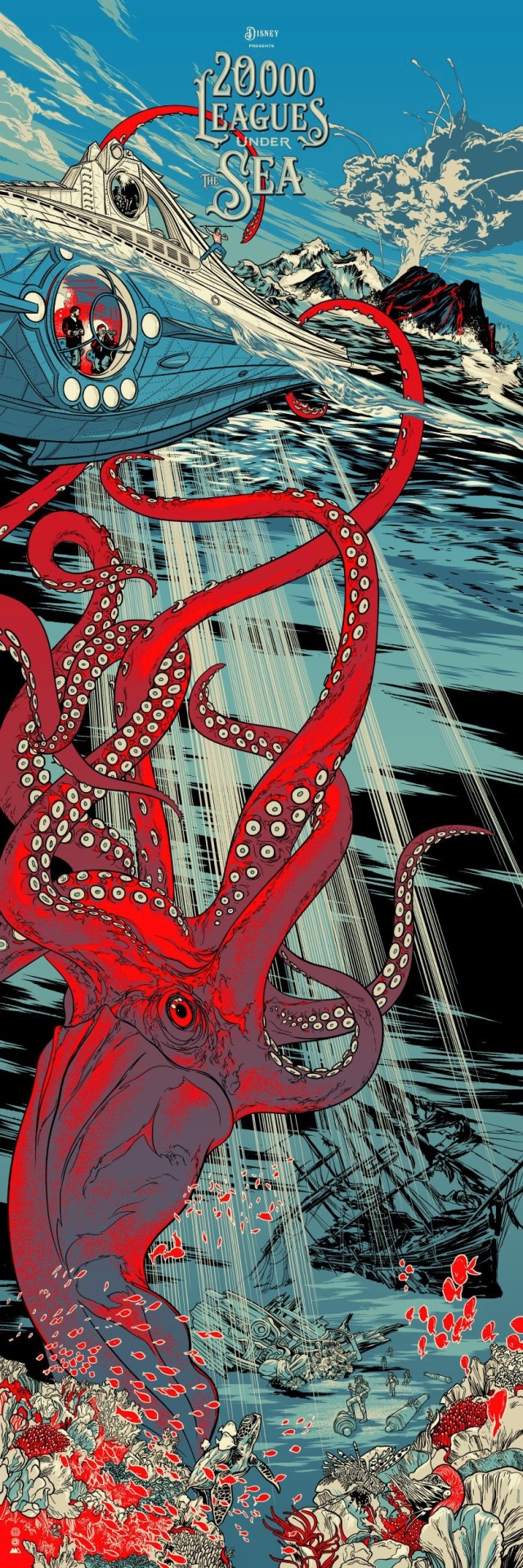
20,000 Leagues Under the Sea Martin Ansin
#Martin Ansin#poster#modern art#illustration#20th century#uruguayan art#art#painting#art history#colors
351 notes
·
View notes
Photo

Alejandro Urdapilleta (deceased)
Gender: Male
Sexuality: Gay
DOB: 10 March 1954
RIP: 1 December 2013
Ethnicity: White - Uruguayan
Occupation: Actor
#Alejandro Urdapilleta#lgbt history#lgbt#mlm#queerness#male#gay#1954#rip#historical#white#Uruguayan#actor
40 notes
·
View notes
Text
read the ball is round ch 8 & 9… so so so interesting
#history of Argentine Uruguayan and Brazilian football and cnxns to politics and then 9 is the same concept but w Europe#specifically btwn 1930 & 50
3 notes
·
View notes
Text
Someone has made playlists with radio recordings of news and speeches of WWII, year by year, and while I could talk to you about how listening to these gives a much better sense of the passage of time and the order of events and such, I'm coming instead to tell you about the silly point that is that in the 40s apparently it was NOT the custom to use acronyms for radio stations.
No one talks about the BBC, everyone talks about the British Broadcasting Corporation. And this is how I learned CBS stands for Columbia Broadcasting System, and NBC for National Broadcasting Company.
#History#WWII#radio#you see this is very important to me#Because Uruguayans have always been lovers of acronyms#Of making good strong ones#and of switching meanings when neccesary#Like when UTE (Usinas y Teléfonos del Estado) became UTE (Usinas y Transmisiones Eléctricas)#But most notably as I have mentioned before#the AMDET (Administración Municipal de Tranvías) was nicknamed by the people#AMDET: Artigas Murió Desesperado Esperando un Tranvía#And lately an association of bus and trams conservationists picked it up as#AMDET: Asociación Montevideana de Entusiastas del Transporte#Point is learning the meaning of acronyms is delightful to me#like that fae thing about names#NOW I KNOW THE NAME OF THE THING AND THAT GIVES ME POWER SOMEHOW
26 notes
·
View notes
Text
The full passenger manifest of Uruguayan Air Force Flight 571, which set off from Montevido, Uruguay to Santiago, Chile, on October 12th, 1972.
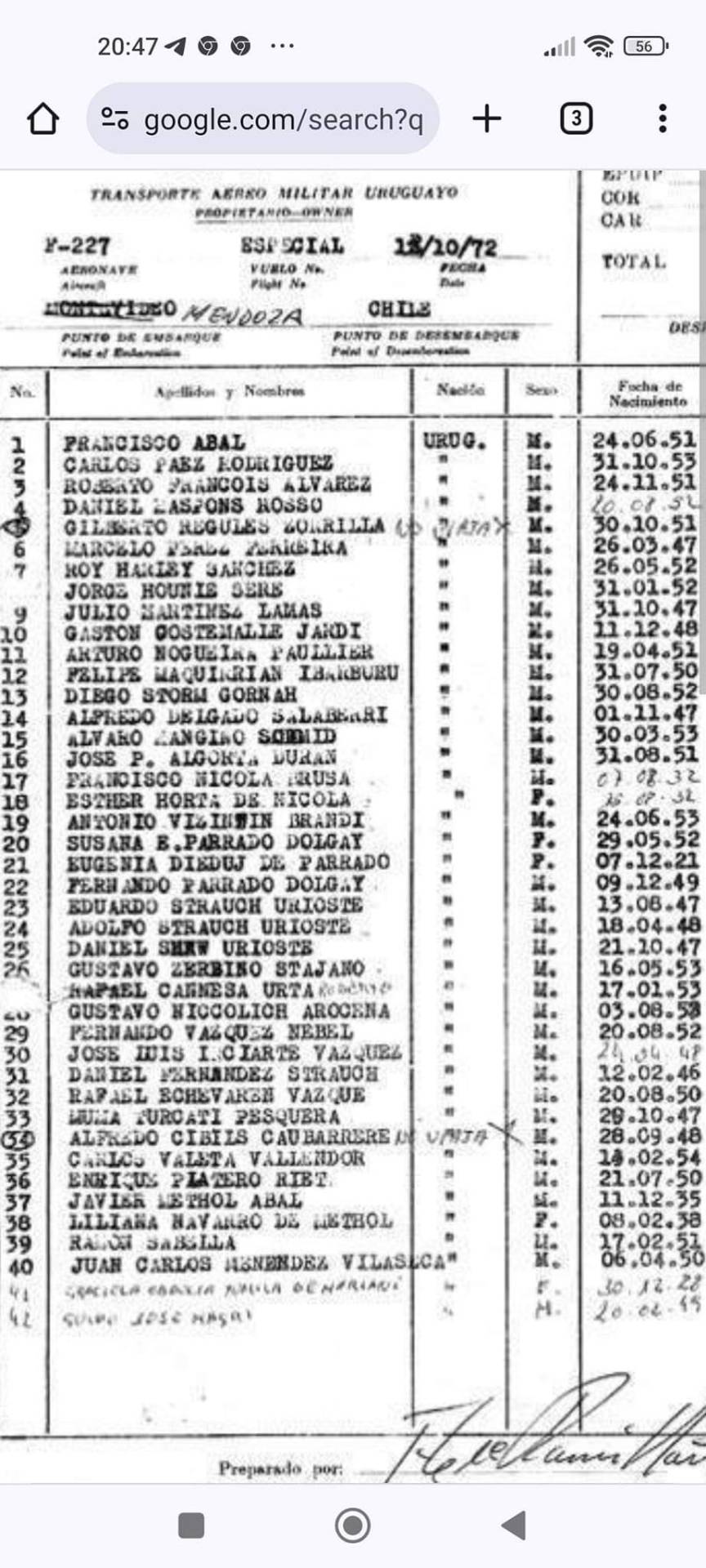
1. Francisco Abal
2. Carlos Paez Rodriguez
3. Roberto Francois Alvarez
4. Daniel Maspons Hossa
5. Gilberto Regules Zorrilla
6. Marcelo Pérez del Castillo
7. Roy Harley Sanchez
8. Jorge Hounie Sere
9. Julio Martinez Lamas
10. Gaston Costemalle Jardi
11. Arturo Nogueira Paullier
12. Felipe Maquirriain
13. Diego Storm Gornah
14. Alfredo Delgado
15. Alvaro Mangino
16. Jose P. Algorta Duran
17. Francisco Nicola Brusa
18. Esther Horta de Nicola
19. Antonio Vizintin Brandi
20. Susanna E. Parrado Dolgay
21. Eugenia Dolgay de Parrado
22. Fernando Parrado Dolgay
23. Eduardo Strauch Urioste
24. Adolfo Strauch Urioste
25. Daniel Shaw Urioste
26. Gustavo Zerbino Stajano
27. Roberto Canessa Urta
28. Gustavo Nicholich Arocena
29. Fernando Vasquez Nerel
30. Jose Luis Inciarte Vasquez
31. Daniel Fernandez Strauch
32. Rafael Echavarren Vasque
33. Numa Turcatti Pesquera
34. Alfredo Cibils
35. Carlos Valeta Vallendor
36. Enrique Platero Riet
37. Javier Methol Abal
38. Liliana Navarro de Methol
39. Ramon Sabella
40. Juan Carlos Menendez Vilascca
41. Graciela Obdulia Augusto Gumila de Mariani
42. Guido Jose Magri
#flight 571#Uruguayan flight 571#miracle in the andes#el milagro de los andes#history#history posts#passenger manifest#survival stories#disaster stories
19 notes
·
View notes
Text
Not gonna get too deep into it because these things are way more personal to me so it is a bit disproportionate and were said back in 2006 (which both indicates a pattern in having incredibly imperialist views but also means he could have learnt since then) but not Gabe using his family history as a shield when the next generation over went through a US backed dictatorship that had them actively flee the country and his takeaway from that was (not an actual quote, it's a summary) "socialized heathcare (where his dad worked at before working directly for the military hospital and then having to run away) sucked and fucked dad over, so when we moved he had to study to be a medical doctor all over again because his degree was not recognized" studying also for free mind you, his dad's alma mater is udelar which is a state funded (but in principle independent to state interests) university that's completely free. This is not some deep lore, the population is small enough to justify that there's literally one school of medicine and his dad has spoken about his time there in publications about his mentor, whom he met in an openly zionist high school (soft reminder that i'm speaking about outside the US, so don't use how minorities nucleate in the US as reference. take the relevant part of what things someone may learn at a zionist high school and pass on to new generations though)
You wanna know why the state of socialized healthcare and education on a country undergoing a right wing military coup sponsored by powers who really really really didn't want countries going 'red' sucked? Because the military regime absolutely destroyed those, by defunding but also suppressing anyone who worked or studied there. On the lower end of the scale intimidating and firing people but like, if you walk in the halls of that place or the ones from the next building over you'll find plaques in rememberance of students (some of them highschoolers) taken from those buildings to be disappeared (practice in which the military kidnaps you and then tortures and murders you, hiding the body in communal graves that then were never disclosed. There is significant trauma attached to those people never being found.). He was 4 when they left. But that's no fucking excuse. I wasn't even born, he knows how to read. He even had his time before he started going off on the 'there is no revolution' or however it was he soft launched cobra.
ok this mainly a vent not an informational post on either gabe saporta's views on the dictatorship or the dictatorship itself and it's not relevant to the situation at hand. other than showing that it's far from new behavior in the larger scale of things. i largely do not believe he means shit on his apology, but am at least glad that someone sat his ass down for the past 24 hs and yelled at him for being a walking pr nightmare and maybe maybe just maybe something genuinely stuck. We'll see.
#i cannot stress enough how this does not go in a measured and in depth analysis#it comes from a place of 'press x to doubt' he's not just using his family history as a defense more than an explanation#i do neguinely believe he has more ties with his jewish past than his uruguayan past too so that's an extra pinch of salt#so like if you wanted to reblog this try to keep it contained#bc it is not the level of critically thought out and phrased that should apply for a genuine conversation about this topic
5 notes
·
View notes
Text
Fans outraged by ‘best 100 players in history’ list with Wayne Rooney OUT but unknown Uruguayan ‘El Gran Mariscal’ in | In Trend Today
Fans outraged by ‘best 100 players in history’ list with Wayne Rooney OUT but unknown Uruguayan ‘El Gran Mariscal’ in Read Full Text or Full Article on MAG NEWS

View On WordPress
#Celebrities#Fans outraged by ‘best 100 players in history’ list with Wayne Rooney OUT but unknown Uruguayan ‘El Gran Mariscal’ in#Money#Motors#Politics#ShowBiz#Sport#Tech#UK#US#World
0 notes
Note
sorry if you've already answered this (i searched ur blog) but if it's okay to ask, do you have any recommended readings for modern marxism (with a racism or colonialism lense)?
ok so prefacing this real quick I am high as hell. and also before i say anything id like to make it clear that i am not an authority on marxist communist theory, honestly i barely consider myself familiar with it. i went to school to study history so i interacted with marxist thought primarily in a historical/historiographical context, and generally in the context of colonial and postcolonial history. even then i studied mostly pre/early colonial american (in the broad sense not the USAmerican sense) & medieval islamic history. my knowledge of modern marxist theory is far from comprehensive.
with that said, I can certainly offer some suggestions, though some of them aren't necessarily marxist theory. but what the hell, lets get intersectional. for funsies. heres a few contributors to colonial/post-colonial/marxist thought that worked a little more recently than the 1800s
Fanon - Frantz Fanon was a french afro-caribbean marxist who, along with his wife Josie (who was the actual one writing, he dictated most of his works to her), wrote Black Skin, White Masks, A Dying Colonialism, and The Wretched of the Earth. From the portions I read while in school I would heartily reccomend all three. The Fanons were masters of decolonial theory and their commentary on whiteness, primitivism, anti-colonial historiography, and colonial class violence (among a billion other things, they were really prolific theorists) is the first place i would recommend people go if they want to start decolonizing their marxism.
Che Guevara - I really hope I don't need to explain who Che Guevara is. Anyways read Guerrilla Warfare and his motorcycle diaries. Oh and while I haven't read any of his work personally, I would imagine Fidel Castro would also be a good one to read for 20th century anti-colonial marxism.
Subcomandante Galeano - Previously known as Subcomandante Marcos, this guy was the figurehead/spokesperson for the EZLN until pretty recently. Our Word is Our Weapon is a collection of some of his writings translated into English.
Eduardo Galeano - Eduardo Galeano was an Uruguayan Journalist and his book The Open Veins of Latin America is a cornerstone of 20th century colonial theory even if it might not strictly be marxist thought.
Edward Said - Said was a palestinian academic and journalist whose book Orientalism is required reading for any colonial historian and should be for any self-proclaimed communist as well. It's perhaps marxist in the broadest sense but it is first and foremost a book about peeling the white supremacy goggles off of your face when studying the history of SWANA, which is a practice you should then apply to every intellectual endeavor you undertake for the rest of your life forever including your marxism.
anyway thats hopefully a good list to get you started. I know a few of my mutuals can probably add recommendations and provide a more educated communist perspective. Like I said before I'm a marxist historian more than I am a marxist in a communist sense.
#caught in the web#personally i dont really consider myself a communist#im an anti-colonialist first and foremost in terms of political theory#the fact that various flavors of communism have been the prevailing anti-colonial theory#just means i exist in plenty of communist circles.#anyways mutuals feel free to pitch in#also im calling it now im gonna get called a poser by someone for not being an expert in marxism
110 notes
·
View notes
Note
top ten non-fiction (general) books and top ten history books?
Naturally, whenever I volunteer to talk about books, I completely forget everything I have ever read, but we'll try to overcome this. Since it is impossible for me to pick them from all-time, I'll do this list from what I have recently read and enjoyed, including both nonfiction and history specifically since most of these fit that bill somehow:
Society of the Snow by Pablo Vierci. Just finished this last night, and it's the source material for the Netflix film of the same name, of the 1972 plane crash of an Uruguayan rugby team in the Andes and their incredible survival odyssey. If you've seen the film, you know how harrowing and also incredibly moving it is.
Pretty much anything by David Grann, including The Wager, Killers of the Flower Moon, Lost City of Z, etc. The Wager is his newest one, though people may have heard of Killers of the Flower Moon, but they're all good. He's up there with Erik Larson as one of my favorite writers of utterly gripping and novelistic nonfiction.
Speaking of Erik Larson: pretty much anything by, including Dead Wake, The Splendid and the Vile, In the Garden of Beasts, etc. Most people will have heard of and/or read Devil in the White City, but his other stuff is equally good. His newest, The Demon of Unrest, is a bit slower than some of the others IMHO, but it's also about the beginning of the Civil War and the crisis at Fort Sumter and is important reading in our current perilous moment.
Challenger: A True Story of Heroism and Disaster on the Edge of Space by Adam Higginbotham. A forensic and incredibly detailed history of the Challenger space shuttle disaster in 1986.
A Travel Guide to the Middle Ages, by Anthony Bale. This is an entertaining and readable introduction to mobility in the Middle Ages: who traveled, where they went, what they thought, and how they reacted and wrote about the other cultures they encountered, from both east and west. Definitely a good entry point for the layman who has heard the "medieval people never traveled/went anywhere" stereotype and knows it's wrong, but wants to know more HOW.
Into the Silence: Mallory, the Great War, and the Conquest of Everest by Wade Davis. Another incredibly detailed doorstopper history book that reads like a novel, exploring 19th-century British imperialism in Asia, the race to climb Mount Everest, the Great War, and more.
Emperor of Rome and SPQR by Mary Beard. These are both incredibly accessible starting points for studying Rome, written by a renowned classicist with a knack for making her historical material and concepts easy to understand and entertaining. Don't be put off by the length of either of these, as they read easily.
The Wide Wide Sea and The Kingdom of Ice by Hampton Sides. The former is his newest book, about the last voyage of Captain Cook, and the latter is my favorite of his other books, about the 19th-century USS Jeannette polar expedition. He is a writer of incredible skill, thoughtfulness, and detail in handling subjects of empire, exploration, colonialism, maritime history, and adventure.
Empire of Pain: The Secret History of the Sackler Dynasty, by Patrick Raddon O'Keefe. A compelling, disturbing, mesmerizing, and infuriating account of the Sackler family, the creation of OxyContin, and the opioid epidemic in America.
Master Slave Husband Wife, by Ilyon Woo. Now, this one is a bit cheating since I haven't actually read it yet (it's on hold at the library), but it's won the Pulitzer Prize for history so I'm fairly sure it's going to be good. It's about 19th century slaves-turned-abolitionists William and Ellen Craft and their race- and gender-bending journey to freedom and anti-slavery activism.
101 notes
·
View notes
Text

Roberto Canessa and Nando Parrado at the BBC Headquarters, 1974
Photo taken during the international "Alive" tour ("Viven" in Spanish), promoting the book by Piers Paul Reid.
#i wonder if RTÉ or the like ever interviewed them#i mean they didn't go to Ireland for...reasons I hope are obvious#but I'll have to check that out in the archives or something if possible#anyway. very fond of this photo. there's a good few couple photos of them in the UK#la sociedad de la nieve#uruguayan history#flight 571#roberto canessa#nando parrado
13 notes
·
View notes
Text
What nationality are you? Well, you see, my nacionality is "Eastern"
?? Ok so you, uh, were born in some country in the eastern part of the world? Not really, not
So you were born in the country the most to the east in your continent or something...? Noup, is not that either jaja sorry lol
"Oriental" as a nacionality for Uruguayans was (and is) an incredible concept because it makes completely no sense whatsoever for anyone but us
#yes it does have a reason as to why#on the other hand jaja saludos for the rest of the world that doesn't know Uruguayan history
5 notes
·
View notes
Text

A decade ago, the world had a brief fascination with José Mujica. He was the folksy president of Uruguay who had shunned his nation's presidential palace to live in a tiny tin-roof home with his wife and three-legged dog.
In speeches to world leaders, interviews with foreign journalists and documentaries on Netflix, Pepe Mujica, as he is universally known, shared countless tales from a life story fit for film. He had robbed banks as a leftist urban guerrilla; survived 15 years as a prisoner, including by befriending a frog while kept in a hole in the ground; and helped lead the transformation of his small South American nation into one of the world's healthiest and most socially liberal democracies.
But Mr. Mujica's legacy will be more than his colorful history and commitment to austerity. He became one of Latin America's most influential and important figures in large part for his plain-spoken philosophy on the path to a better society and happier life.
-- Here's a gift link from me to bypass the paywall and read this wonderful New York Times interview of lifelong activist, revolutionary, and former Uruguayan President José "Pepe" Mujica, who is still trying to pass along his hard-earned wisdom and political philosophy even as he's likely dying from cancer.
#History#José Mujica#Pepe Mujica#José “Pepe” Mujica#Uruguay#Latin America#Latin American Politics#Liberals#Progressives#Politics#Socialism#New York Times#Wisdom#Revolutionaries#Activists#Philosophers#Philosophy#President of Uruguay#Latin American Leaders
61 notes
·
View notes
Text
So given the writer’s strike, some people are concerned about their shows and movies being postponed or canceled, and aside from the fact networks have already BEEN canceling shows for no reason for years (I still maintain a healthy anger about what Netflix did to Sense8), I thought I would suggest some books on disasters you might want to read if you’re into that sort of history. Which you are if you’re here, I imagine.
Note: I’m suggesting these books because most books on disasters don’t get a huge audience, and so I recommend them because this sort of writing can be hard on the writer and requires a bunch of research. We throw so much money at true crime, we can spare a few bucks for the stories of people who died in disasters.
Also, please check with these with your local small bookstore or library. Amazon can be great, but let’s lend a hand to those who need us more.
Recommended books:
“The Circus Fire,” by Stewart O’Nan - This is one my favorite books on a disaster, because the whole thing creates a very vivid image of the circus prior to the fire in Hartford in July of 1944. There’s one specific line in the book which always makes me pause because it’s so affecting, about how everyone who escaped being able to hear the sounds of the animals screaming as they died - except all of the animals were out of the tent by then.
“The Only Plane in the Sky,” by Garrett Graff - This, I highly recommend you get on audiobook. It’s an oral history of the events of 9/11 with a full cast, and it’s incredibly affecting to listen to.
“Ada Blackjack: A True Story of Survival in the Arctic,” by Jennifer Niven - Ada Blackjack was a badass: flawed and weak at times, but hardy and steady when necessary. Half of her story is how she survived, but half is how she was exploited following her rescue. Both stories need to be known.
“Alive,” by Piers Paul Read - If you’re watching “Yellowjackets,” this should be required reading. If you’ve seen the movie adaptation from the 90s, there is WAY more you don’t know. The story of Uruguayan Air Force Flight 571 is a tough read, but a worthy one.
“A Night to Remember,” by Walter Lord - This is to disaster nonfiction what “In Cold Blood” is to true crime. It’s not a long read, but it’s a great one. Lord had the advantage of writing the book while many of the Titanic survivors were still alive and could give a very good description of what they went through.
“Dying to Cross,” by Jorge Ramos - I recommend this not just because it is good, but because it is timely. Nineteen people died in an un-air-conditioned truck as they were attempting to make their way into the states from over the Mexican border. It’s a horrific story, and one that humanizes an issue for whom some people need to be faced with the humans involved and what they go through.
“Bath Massacre: America’s First School Bombing,” by Arnie Bernstein - Harold Schecter also wrote a very good book on the Bath school massacre called “Maniac,” but I have a preference for this version. It’s a good reminder that schools in the U.S. didn’t just become targets in the last twenty years or so.
“Into Thin Air,” by Jon Krakauer - I feel like this is a gimme, but it’s a fantastic book from someone who was actually on Mount Everest during the 1996 disaster and knew those involved very well. I happen to like Krakauer’s work anyway - I even like “Into the Wild” despite my feelings about McCandless and his legacy - but it’s understandably my favorite.
“And the Band Played On,” by Randy Shilts - The one thing I will say is that Shilts’ treatment of Gaetan Dugas is *rough* to say the least and outright wrong on some points, God knows. But it’s still an amazing book, and if you come out of it not wanting to dig up Reagan and punch him a bunch I’m impressed at your restraint.
“Triangle: The Fire That Changed America,” by David von Drehle - The Triangle Shirtwaist Factory Fire is one of the disasters I am most interested in, and I would argue this is the definitive book on the subject. Also, if this book introduces you to both Clara Lemlich and Frances Perkins … I mean, talk about badass women.
“The Radium Girls,” by Kate Moore - Look, I’ll say this. If you know of the Radium Girls, this is a great book on their story. If you don’t know, go in blind and prepared to be horrified.
“Red Famine: Stalin’s War on Ukraine,” by Anne Applebaum - Ukraine has always been a target. During the Holodomor, they were victims of one of the worst genocides in history.
“Midnight in Chernobyl,” by Adam Higginbotham - Like the miniseries? This is a great source for more information for what happened at Chernobyl and all of the ass-covering involved.
"Boston Strong: A City's Triumph Over Tragedy," by Casey Sherman and Dave Wedge - If you’re interested in the Boston marathon bombing, I really thought this book did a good job of connecting the stories of the victims, the authorities searching for the killers, and the killers themselves.
“Show Me the Bodies: How We Let Grenfell Tower,” by Peter Apps - As I understand it, Apps did a lot of covering the Grenfell Tower fire for the British press, and it shows. He provides a mountain of information, and you will come out of reading this book absolutely LIVID about what authorities allowed to happen in Grenfell and so many other council estates in the UK.
“Dark Tide: The Great Molasses Flood of 1919,” by Stephen Puleo - I feel as though the molasses flood gets treated like a joke a lot of the time, but y’all, twenty people died. That area of Boston was *wrecked*. The photos of the devastation are terrifying. Puleo treats all of this with the proper respect it deserves.
“In the Heart of the Sea: The Tragedy of the Whaleship Essex,” by Nathaniel Philbrick - Forget the movie. Read the book.
“The Great Influenza,” by John M. Barry - Want to read about the 1918 flu epidemic? Want to be mad that a hundred years later we didn’t learn a damn thing?
Now, that’s just a start. If anyone wants, I can always post photos of my disaster book collection on Kindle and next to my recording desk. Or if there’s a specific disaster you’re interested in, I may know of a good book about it you can read.
But just remember if SAG and the directors’ guild joins the strike too - there is so much out there to occupy your time until they come back. Entertainment work is work, and it deserves to be supported financially and fairly as such. Rock on, WGA. ✊
431 notes
·
View notes
Text
youtube
Short documentary by the American government about my country (despite the Spanish title, the video is in English)
youtube
Another one, focused on education.
#Uruguay#historical footage#it's such a curious and informative watch#on one hand because it's really sad in the way I as a contemporary uruguayan can see all the ways#in which we have decayed#But also seeing an American-government-made documentary that so heavily praises#in a wwii and early cold war context#things that would nowadays sound socialist/communist to American ears#Also stuff like seeing the Social Security Bank building surrounded by very small trees#that I have seen as these huge old trees all my life#pretty much everyone on that footage is gone#but the trees remain#borrowing fictionadventurer's tag#history is awesome#but in a primary sources way rather than an amazing history way#also hear me mourning the destruction of the low and middle range national production of wool#Youtube
12 notes
·
View notes
Text
Nike and Corinthians launch third kit inspired by women's football and with an anti-racist message.
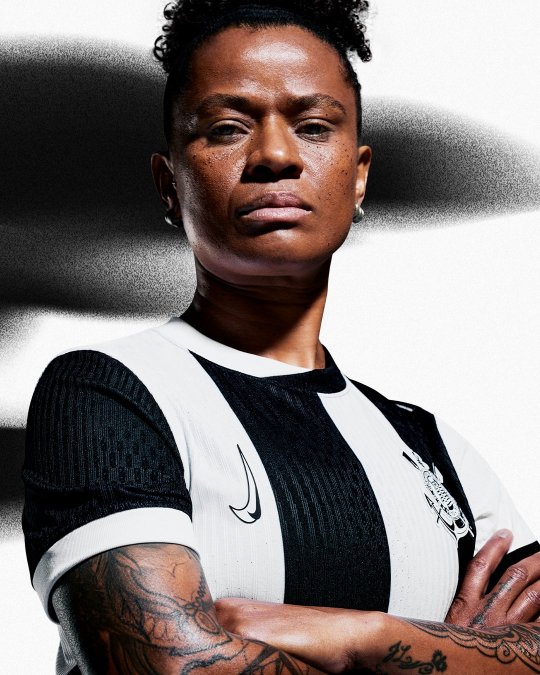
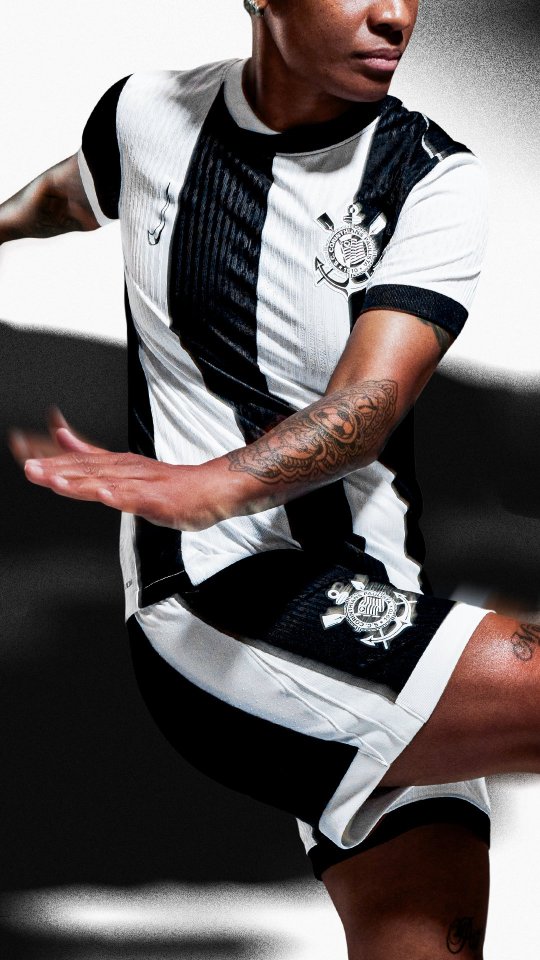
The campaign is the same as the first and second kits, but this time it is even more incisive in the fight and glories of the black women who have worn and still wear the club's colors.
As the main model we have Grazi, the most successful player (among men and women) in the history of Sport Club Corinthians Paulista and who was the protagonist in a game valid for the Copa Libertadores da America in 2021. During the match against Nacional, some players on the Uruguayan team made racist comments and attitudes towards Adriana (who now plays for Orlando Pride), causing outrage among all the players and coaching staff of the Brazilian team. At the end of the match, Grazi scored a goal and celebrated with her fist raised, starring one of the most iconic and remembered photos of the club.

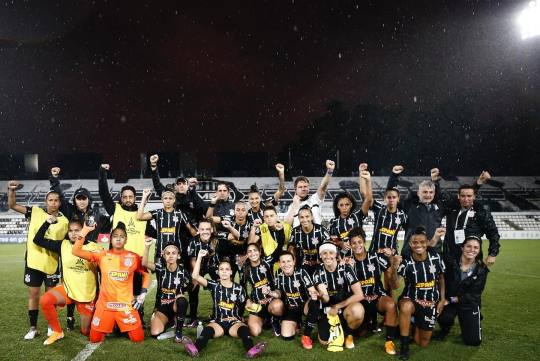
Despite now being retired from the pitch, Grazi continues her story at Corinthians as a member of the coaching staff and participating in campaigns like this one, which are much more than special in raising awareness among athletes, society and those who are victims of discrimination.
Also notable is the difference in Nike's vertical swoosh. This is present on several of the brand's third kits and represents the fast evolution and rise of women's football.
#grazi#e7erna capitã#sport club corinthians paulista#corinthians feminino#corinthians#sccp#brwnt#brawnt#brazil wnt#brazil#brazil national team#brazil women national team#brasil#seleção brasileira#women football#woso#woso community#woso history#woso appreciation#nike#just do it#woso soccer
29 notes
·
View notes